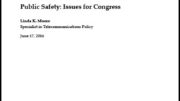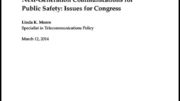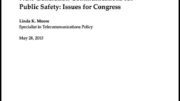Linda K. Moore
Specialist in Telecommunications Policy
February 27, 2015
Summary
Congress included provisions in the Middle Class Tax Relief and Job Creation Act of 2012 (P.L.
112-96) for planning, building, and managing a new, nationwide, broadband network for public
safety communications, by creating the First Responder Network Authority (FirstNet). The act
assigned 10 MHz of additional radio frequency spectrum to accommodate the new network and
required that the Federal Communications Commission (FCC) assign a license to FirstNet,
comprising the newly assigned frequencies and 10 MHz previously assigned to states by the FCC
for public safety use. In addition, the act has designated federal appropriations of over $7 billion
for the network and other public safety needs. These funds are provided through new revenue
from the auction of spectrum licenses to the commercial sector.
The establishment of FirstNet is an important step toward reaching what has been a widely shared
national goal since September 11, 2001: the provision of interoperable communications for first
responders. The immediate goal for FirstNet, however, is to provide a broadband network to carry
data, although it will provide an option for voice communications as well. Mission critical voice
communications will, in many states, be available over Land Mobile Radio (LMR) networks
operating on narrowband frequencies previously assigned by the FCC. States participating in
FirstNet may need to continue to invest in and maintain their narrowband networks and will
likely at the same time be required to fund some part of the build out of state Radio Area
Networks proposed by FirstNet, as required in the act. The cost of construction of a nationwide
network is estimated by experts to be in the tens of billions of dollars over the long term, with
similarly large sums needed for maintenance and operation. The law anticipates that some of
these costs will be covered by partnerships that permit access to FirstNet’s spectrum, and shared
use of infrastructure. How much of the benefit of these partnerships will accrue to FirstNet and
how much will be available to the states for state-owned and operated networks in their
jurisdictions is undetermined.
In addition to monitoring progress in building the new broadband network for public safety,
Congress may want to consider ways to ensure that FirstNet will be self-sustaining and that the
states will have adequate funds to participate in FirstNet and to maintain public safety
communications networks.





Be the first to comment on "The First Responder Network (FirstNet) and Next-Generation Communications for Public Safety: Issues for Congress 2015"